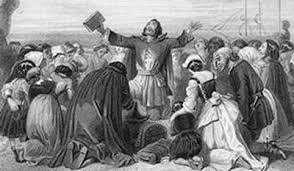puritan
英 ['pjʊərɪt(ə)n]
美 ['pjʊrɪtən]
puritan 禁欲者,清教徒来自purity,纯洁,纯净,-an,人。比喻用法。
- Puritan (n.)
- 1560s, "opponent of Anglican hierarchy," later applied opprobriously to "person in Church of England who seeks further reformation" (1570s), probably from purity. Largely historical from 19c. in literal sense. After c. 1590s, applied to anyone deemed overly strict in matters of religion and morals.
What [William] Perkins, and the whole Puritan movement after him, sought was to replace the personal pride of birth and status with the professional's or craftsman's pride of doing one's best in one's particular calling. The good Christian society needs the best of kings, magistrates, and citizens. Perkins most emphasized the work ethic from Genesis: "In the swaete of thy browe shalt thou eate thy breade." [E. Digby Baltzell, "Puritan Boston and Quaker Philadelphia," 1979]
- 1. Bykov had forgotten that Malinin was something of a puritan.
- 贝科夫已经忘记了马利宁是个清教徒式的人物。
来自柯林斯例句
- 2. Paul was someone who certainly had a puritan streak in him.
- 保罗身上无疑带有清教徒气质。
来自柯林斯例句
- 3. His dissolute life is inconsistent with his Puritan upbringing.
- 他的放荡生活和他的清教徒教养相悖.
来自《简明英汉词典》
- 4. This dramatic vigour is the chief strength of Puritan writing.
- 这种生气勃勃的劲头便是清教时期写作的主要动力.
来自辞典例句
- 5. No other Puritan writers than Tyler in America displayed such verbal riches.
- 美国的清教徒作家在词藻运用上,没有一个比泰勒更丰富的了.
来自辞典例句
[ puritan 造句 ]
